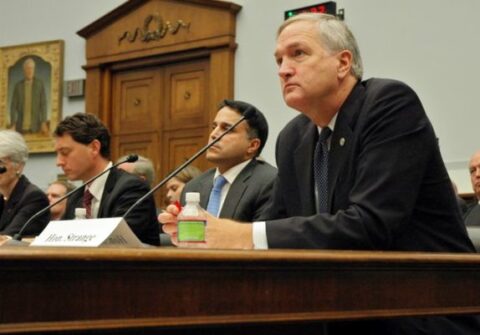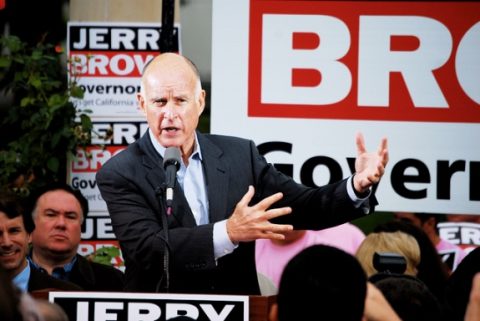Economics

A Small Step Toward Reform: Bipartisan Bill Seeks to Raise Per Country Immigration Caps
An immigration bill introduced by Congressmen Lamar Smith and Jason Chaffetz and supported by Democrats may actually have a chance at passing in Congress. Scheduled for a mark up this week, the bill (H.R. 3012) would make small but significant changes to the way green cards are distributed by eliminating per country numerical limits on employment-based green cards and raising the limits on family-based green cards which go to immigrants from each country. Read More

Some Alabama Businesses Having Trouble Replacing Immigrant Workers
Just two weeks after Alabama’s extreme immigration law (HB 56) went into effect, many are reporting an exodus of immigrants, Latinos and their families from the state. While HB 56 supporters cheer the exodus as a victory, many Alabama businesses say they are left without an adequate workforce. Despite assurances from Governor Bentley that U.S. citizens will gladly take those jobs, Alabama farmers, meat processors and housing contractors are finding that U.S. citizen or legal workers are either not willing or able to take those jobs—leaving fruit to rot on the vine and home reconstructions projects unfinished. Not only will this hurt Alabama business in the short term, economists say, but will shrink the state’s economy and productivity over time. Read More

Dayton, Ohio Passes Plan to Revitalize Economy through Immigrant Integration
Shortly after Alabama began implementing their anti-immigration law (HB 56), Dayton, Ohio passed legislation that welcomes and integrates immigrants with the hope that they will revitalize their slowing economy. Faced with a declining population, Dayton’s City Commission voted unanimously last week to adopt the Welcome Dayton Plan—a plan that is tapping into the very economic stimulus that Alabama is driving out. Read More

The Facts (and Numbers) Don’t Matter in Alabama
Alabama Attorney General, Luther Strange, testifying before Congress. Photo by lutherstrange. As each day passes under Alabama’s new, highly restrictive immigration law (HB56), it is becoming increasingly clear that facts (and numbers) had very little to do with the passage of the law—and that they continue to be ignored as state officials defend the law. In fact, this willful disregard of facts and data may mean Alabama is about to pay a very high price for a small problem. Read More

Governor Jerry Brown Signs Immigration Bills that Help, Not Hurt, California’s Economy
Take note, Alabama. Over the weekend, Governor Jerry Brown signed two immigration bills that seek to boost California’s struggling economy, rather than saddle it and small businesses with costly enforcement programs. Governor Brown signed the “Employment Acceleration Act of 2011” (AB 1236), a bill that prohibits the state from requiring employers to use E-Verify, as well as the other half of California’s DREAM Act (AB 131), a bill which makes college more affordable for undocumented students and “benefits us all,” as Gov. Brown says, “by giving top students a chance to improve their lives and the lives of all of us.” Read More

Declining Cities Look to Immigrants to Revitalize Economies and Increase University Enrollment
In a recent speech to the U.S. Chamber of Commerce, New York City Mayor Michael Bloomberg highlighted the vital role immigrants play in stimulating economic growth. Bloomberg called for immigration policies that “spur innovation, increase the number of entrepreneurs who start businesses here, and create jobs for Americans on every rung of the economic ladder." With U.S. unemployment still hovering around 9%, some declining U.S. cities are also looking to harness the economic and entrepreneurial power of immigrants. Small towns, particularly in America’s rust belt, are contemplating programs that attract immigrant growth in hopes of revitalizing their towns and universities. Read More

Can Alabama Afford to Enforce their New Restrictive Immigration Law?
This week, U.S. District Judge Sharon Blackburn failed to enjoin major provisions of Alabama’s extreme immigration law, HB 56, a law designed to drive unauthorized immigrants from the state. Under the law, police officers are now required to demand proof of legal status from anyone who seems foreign. School administrators are required to ask children about their immigration status and that of their parents. People and businesses—including utilities companies—are encouraged not to enter into contracts with anyone who cannot prove their legal status. While some anti-immigrant groups are celebrating the judge’s decision, Alabama businesses and state agencies may ultimately bear the economic brunt of this damaging law. Read More

Mandatory E-Verify: An Enforcement Proposal Even Conservatives Don’t Like
Rep. Lamar Smith may find himself whistling in the wind this week as members of his own party continue to blast his E-Verify proposal. Smith’s bill, The “Legal Workforce Act” H.R. 2885, which continues to get marked up this week by the House Judiciary Committee, would make E-Verify mandatory nationwide. Conservative lawmakers, Tea Partiers, and Libertarians, however, fear that E-Verify—a electronic system that allows employers to verify work eligibility by checking employee data against Social Security Administration records—will violate civil liberties, hurt small businesses, and destroy the agriculture industry which relies heavily on undocumented labor. Read More

Better Immigrant Integration Leads to Economic Growth
Over the weekend, more than 27,000 people became American citizens during 285 naturalization ceremonies held across the country in honor of Citizenship Day (September 17). Becoming a citizen, however, is hard work. A new country, new rules, high costs, and little targeted support for new immigrants make what should be a journey of exploration and opportunity one that may be frustrating and lonely. Not surprisingly, problems such as these are a major obstacle to naturalization. Scholars note that despite the steady rise in naturalization rates over the decades, a shocking number of people do not naturalize are actually eligible to do so. In 2008, for example, while more than one million LPRs naturalized, more than eight million were eligible to do so. Developing better integration programs, however, may improve naturalization efforts and lead to economic growth. Read More

Lamar Smith’s E-Verify Arguments Defy Logic and Lack Evidence
Facing opposition from the left and the right, Rep. Lamar Smith appears to be willing to do and say just about anything to pass his “Legal Workforce Act,” (H.R. 2885), which would make E-Verify mandatory for all U.S. businesses. Smith continues to tout E-Verify as a magic bullet that will create jobs for millions of American workers despite all evidence to the contrary. Read More
Make a contribution
Make a direct impact on the lives of immigrants.
